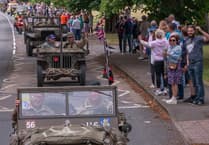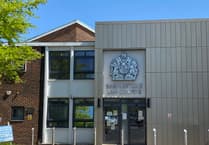ALTON police need the support of witnesses if they are to take action against travellers.
And they will be using video cameras to keep a watchful eye on unwelcome trespassers in a move to clamp down on anti-social behaviour.
But they were unable to come up with all the answers people wanted to hear during a public debate on the invasion of travellers.
It appears they have few powers to deal with low scale trespass, which is in fact a civil matter and should be dealt with by the landowner or tenant.
Only in "exceptional circumstances" can they draw on powers provided under the Criminal Justice and Public Order Act 1994, for example when dealing with mass trespass by New Age travellers in public spaces, or when handling raves or animal rights protests.
The emotive subject of trying to remove comparatively small numbers of unwelcome travellers from private land is a different ball game.
Local people affected by recent invasions of travellers in the Alton area were among those keen to hear the presentation given at last week's meeting of East Hampshire District Council's north west area community committee meeting by Hampshire Constabulary's officer responsible for travellers, Sgt Richard Blackford, supported by Alton Inspector, Steve Mote.
In acknowledging Alton's long tradition of visits by the travelling community, Sgt Blackford admitted that the nature of these visits had changed - they had become more frequent and longer in duration, causing disruption to members of the community in terms of litter, damage and intimidation.
As a result of public concern, the police had decided to review their response to the situation.
They had to address what residents viewed as "a seeming unwillingness or inability to move people on" and to deal with criminal offences.
On the first count, Sgt Blackford confirmed that low key trespass on private land was a civil matter and it was not policy for police to get involved since it would undermine their ability to remain impartial.
Only in exceptional circumstances would they take action under the '94 Act, but this would require the deployment of a large number of officers from across the county to enforce any such action, accompanied by necessary vehicle back-up and the ability to care for any children and vehicles remaining if arrests were made.
Inspector Mote highlighted the financial implications - a recent operation to remove a large number of travellers in Portsmouth had taken three weeks to organise and £25,000 of tax payers money, he said.
On the question of prosecuting those involved in criminal activity, Sgt Blackford stressed the difficultly of obtaining evidence required to prove guilt.
It was easier, he said, to bring a case against a group rather than an individual, but it did require witnesses and people were often reluctant to put themselves forward for fear of retaliation.
While the call was for more support in this area, the police, he said, were encouraging people to work together in a move to promote a pro-active response which, it is hoped, will discourage travellers from invading the area or, at the very least, of using anti-social behaviour.



